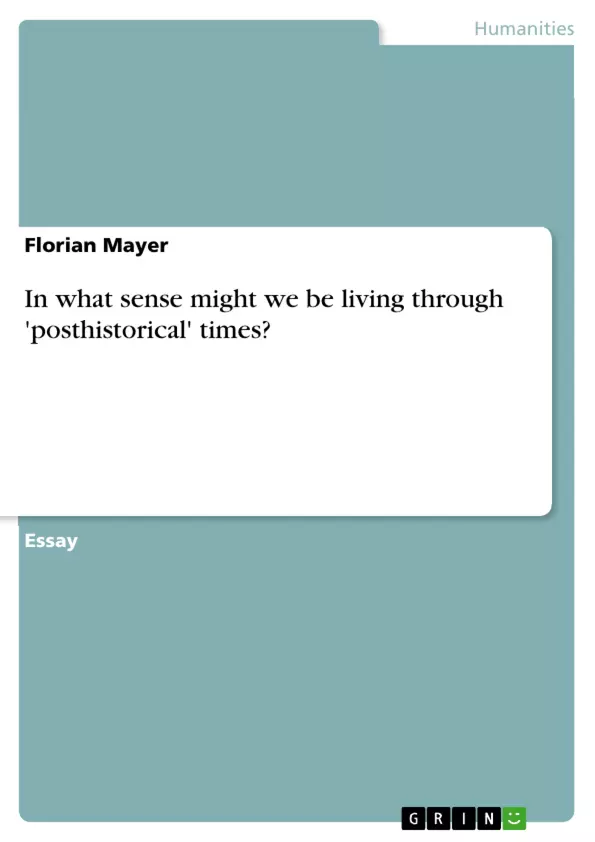At the beginning of the new century the perception that we are living at a time of deep change, in practise as well as in thought, is widespread. In recent years the social and human sciences proclaimed that we are entering a time of ′endism′, a period of post-capitalism, post-industrialism, post-socialism and above all of post-modernism and post-modernity. The number of different ′post′ labels suggests a deep uncertainty about the present as well as the future and agreement between the different theories exist only in the view that ′things are not what they used to be′. In the following, this paper aims to examine in what sense we might be living through posthistorical times.
Inhaltsverzeichnis (Table of Contents)
- In what sense might we be living through ‘posthistorical' times?
- The idea that history will end
- The first threat to the subject matter of history
- Notions of whose history counts
- Another critique coming from the ‘skeptical postmodernists'
- The idea that realism is just a discursive effect
- Benjamin indicates further problems of historicism
- Similarly, for Foucault, historical knowledge is inevitably positioned and used for cutting
- Today's implosion of the real in a culture that devours and resignifies everything
Zielsetzung und Themenschwerpunkte (Objectives and Key Themes)
The purpose of this essay is to examine theories from postmodernism to end-of-history philosophy, focusing on their implications for conventional history and the idea of a "post-history." It seeks to understand how these theories challenge traditional views of history and the understanding of the past.
- The Critique of Conventional History
- The End of History Thesis
- Postmodernism and Historical Discourse
- The Role of Technology and Hyperreality
- The Dissolution of Metanarratives
Zusammenfassung der Kapitel (Chapter Summaries)
- This chapter explores the concept of "posthistorical" times and introduces the idea that we are living in a period of deep change, marked by the rise of postmodernism and end-of-history theories.
- This section examines the argument that history has ended due to the loss of Enlightenment certainty in the unity and direction of culture. It explores the ideas of Vattimo and Gehlen on the condition of posthistory and the decline of traditional historical narratives.
- This chapter focuses on the deconstructionist view of history, arguing that historical narratives are constructed through discourses and are not fixed. It examines the ideas of Derrida, who suggests that meaning is always deferred and reality is actively produced, not given.
- This section continues the critique of universal accounts of history, highlighting the ideas of Deleuze, who argues that historical narratives are often used to legitimize power structures and perpetuate hierarchies.
- This chapter delves into Barthes's view of history as a discourse and his critique of the historical narrative's tendency to reduce reality to a two-term structure. He argues that historical discourse is a performative act of authority and that the selection of historical facts is often arbitrary.
- This section discusses Benjamin's critique of historicism, which views the past as determining the present and privileges the history of the powerful. He argues that historicism forgets the consequences of past actions and is complicit with the ruling class.
- This chapter examines Foucault's rejection of history as a reasoned analysis and his emphasis on "limit," "rupture," and "transformation." He argues that total history is replaced by general history, which is a series without origin or destination.
- This section explores Baudrillard's nihilistic account of late twentieth-century culture as a self-referential system of signs, where it is no longer possible to distinguish image from reality. He calls this condition "hyperreality" and attributes it to the development of modern technologies of information and communication.
Schlüsselwörter (Keywords)
Key terms and concepts explored in this essay include postmodernism, end-of-history, deconstruction, historicism, hyperreality, metanarratives, historical discourse, and the critique of conventional history. The essay examines how these ideas have shaped our understanding of the past, present, and future.
- Quote paper
- Florian Mayer (Author), 2003, In what sense might we be living through 'posthistorical' times?, Munich, GRIN Verlag, https://www.grin.com/document/13596



